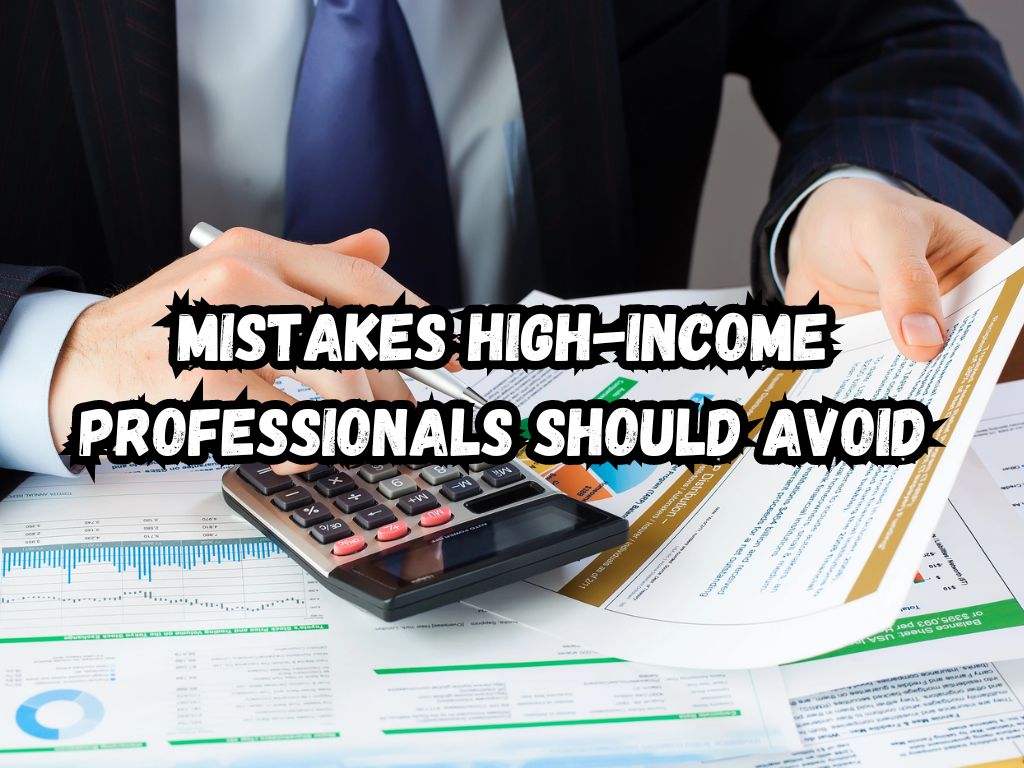High-income professionals often face a unique set of financial challenges. While their earning potential is significant, so is their potential for financial missteps.
Strategic financial planning becomes crucial to navigate this complex landscape. This article delves into common mistakes and offers guidance for avoiding them.
7 Major Mistakes High-Income Professionals Should Avoid
Not Taking Advantage of Tax Planning
Tax planning is pivotal for high-income individuals. Many fail to fully utilize tax-deferred opportunities, such as contributions to 401(k)s and IRAs. These accounts can offer substantial tax savings and should not be overlooked.
Another oversight is not seeking personalized tax strategies from a professional. Given the complexities of tax laws, a one-size-fits-all approach can lead to missed opportunities for tax reduction.
A pro tip here is to schedule annual sessions with a financial advisor to tailor a tax strategy that aligns with your financial goals.

Inadequate Asset Protection
The risk of financial loss can be more significant for those with more assets. High-income professionals should not underestimate liability risks.
Real-world scenarios, such as lawsuits, can and do happen, leading to substantial financial loss.
Furthermore, not having umbrella insurance is a common oversight. This additional coverage can protect against claims that exceed other insurance policies.
Assets and protection strategies need regular reviews to accommodate evolving personal and professional circumstances.
Neglecting Estate Planning
The consequences of not having an updated will or estate plan can be dire. In the absence of such documents, state laws determine asset distribution, which might not align with the deceased’s wishes.
Additionally, healthcare directives and powers of attorney are often forgotten. These are crucial for managing healthcare and financial decisions when someone is unable to do so themselves.
A pro tip is to consider establishing a trust. Trusts can offer more control over how assets are distributed and provide for beneficiaries while avoiding the public and lengthy process of probate.
Poor Investment Decisions
Chasing short-term returns over a long-term investment strategy is a tempting mistake. This approach often leads to hasty decisions based on market fluctuations rather than a consistent investment philosophy.
Another pitfall is failing to diversify investments. Diversification can significantly reduce risk by spreading investments across different asset classes.
It’s recommended to have a goal-oriented investment strategy, focusing on long-term financial objectives rather than immediate gains.
Overspending and Under-saving
Lifestyle creep can imperceptibly increase spending as earning goes up, leaving less for savings. It’s imperative to remain vigilant about spending habits, regardless of income level.
Starting to save for retirement early takes advantage of compounding interest, significantly impacting long-term financial health.
Automating savings can ensure consistent investment over time and reduce the temptation to spend.
Failing to Plan for Illness and Disability
A lack of adequate disability insurance is a common oversight. High-income earners can see their lifestyles significantly impacted by a sudden inability to work. Disability insurance can provide a safety net in such instances.
Moreover, not preparing for long-term care costs can put undue stress on retirement savings. Exploring options for managing these potential expenses early on is advisable.
Not Seeking Professional Financial Advice
Some professionals feel confident in managing their finances independently. However, high-income individuals face complex financial landscapes that merit professional guidance.
The expertise of a financial advisor can prove invaluable in navigating tax strategies, investment opportunities, and estate planning.
Selecting the wrong advisor, however, can lead to misguided strategies that don’t align with personal financial goals.
It’s critical to choose an advisor with a proven track record, who understands your financial aspirations and offers customized advice.
An experienced advisor will help optimize your financial portfolio to achieve long-term security and growth.

Frequently Asked Questions
How often should high-income professionals review their financial plans?
Financial plans should be reviewed at least annually or after significant life changes.
Can high-income professionals benefit from robo-advisors?
While robo-advisors offer convenient investment management, high-income individuals might need more personalized advice.
What is the most common financial mistake made by high-income earners?
One common mistake is failing to adequately save and invest due to increased spending with higher income.
How can high-income professionals balance aggressive investment strategies with risk management?
A diversified portfolio can help balance the quest for high returns with the need to mitigate risk.
Are there any unique investment opportunities that high-income professionals should consider?
Alternative investments, such as real estate or private equity, might be suitable for those seeking diversification beyond traditional stocks and bonds.
Conclusion
Financial planning is an ongoing process that requires attention and adjustment. High-income professionals, in particular, must be mindful of the unique pitfalls that come with higher earnings.
By avoiding these common mistakes and seeking professional advice when needed, it’s possible to significantly enhance one’s financial stability and security.
High-income professionals stand at a unique crossroads where opportunity and risk are significant. Proper financial planning and awareness can turn these challenges into a path toward long-term prosperity.


 Tags:
Tags:










